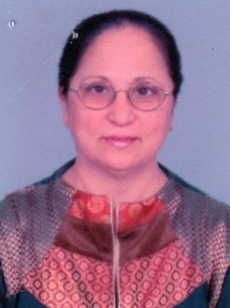
DR RENU ACHTANI
Neurologist
- Fees: INR 850
-
Monday 10:30 AM - 1:00 PM
(See all timing)Monday 10:30 AM - 1:00 PM,
Tuesday 6:00 PM - 7:00 PM,
Wednesday 10:30 AM - 1:00 PM,
Thursday 6:00 PM - 7:00 PM,
Friday 10:30 AM - 1:00 PM,
Saturday 6:00 PM - 7:00 PM
Introduction
Dr. Renu Achtani is one of the best Neurologist in New Delhi and has an experience of over two decades in this field. She works at the Fortis Hospital Vasant Kunj since 2006. Dr. Achtani manages patients of stroke, epilepsy, movement disorders, neuropathies, headache and CNS infections. The electrophysiology lab is under her supervision where tests like EEG nerve conduction are studied, EMG and evoked potentials are conducted. Dr. Renu Achtani has been treating patients with movement disorders and spasticity and uses Botox where necessary. Dr. Renu Achtani also treats acute and chronic stroke patients and offers thrombolysis to patients if they are eligible for it at Fortis Hospital, Vasant Kunj.
Hospital Associations
Fortis Flt. Lt. Rajan Dhall Hospital, Vasant Kunj
Services/Interest
- Stroke
- Epilepsy
- Movement disorders
- Neuropathies
- Headache
- Thrombolysis
- Dementia
- Ataxia
- Neuritis
- Multiple sclerosis
- CNS infections
- Brain Paralysis
- Ischemic / Brain Haemorrhage
- Mental Retardation
- Nerves
- Radicals
- Plexus
- Acquired loss of Brain Function
- Treatment for Parkinsonism
- Sleep disorder
- Spinal Cord Disorder
Experience
Dr. Renu Achtani is a renowned Neurologist in New Delhi. She has been practicing for 20 years and deals with the diagnosis and treatment of all conditions and disease involving the central and peripheral nervous system. Presently, she is providing her consultation in Fortis Flt Lt Rajan Dhall Hospital, Mata Chanan Devi Hospital, and Holy Angels Hospital, Delhi.
Education
MBBS from Gandhi Medical College, Hyderabad in 1980. DCH from Niloufer Hospital, Hyderabad in 1985. MD(General Medicine) from Kakatiya Medical College , Warangal in 1985. DM(Neurology) from Nizam's Institute Of Medical Sciences, Hyderabad in 1985.
I Speak
English, Hindi
Feedback For Dr Renu Achtani
Write FeedbackFortis Flt Lt Rajan Dhall Hospital Vasant Kunj Timing
Monday
10:30 AM - 1:00 PM
Tuesday
6:00 PM - 7:00 PM
Wednesday
10:30 AM - 1:00 PM
Thursday
6:00 PM - 7:00 PM
Friday
10:30 AM - 1:00 PM
Saturday
6:00 PM - 7:00 PM
What is a neurologist?
Neurology is the branch of medicine that focuses on study and treatment of disorders of the nervous system. A neurologist is a physician who specializes in treating diseases of the nervous system which is made of two parts: the central and peripheral nervous system. It includes the brain and spinal cord.
Before neurologists can practice, they must:
- Graduate from medical school
- Complete an internship
- Receive 3 years of training in a Neurology residency program.
What are the diseases treated by the neurologists?
- Stroke and Neurological trauma
- Tumors of the nervous system
- Infections of the nervous system
- Multiple sclerosis and other autoimmune diseases
- Epilepsy and Headaches
- Peripheral nerve disease
- Neuromuscular diseases
- Dementia
- Movement and Sleep disorders
When should you go and see a neurologist?
A person should go and see a neurologist if he is suffering from:
- Severe headaches and chronic pain.
- Dizziness, numbness or tingling.
- Chronic weakness.
- Problems with movement and vision problems.
- Seizures
- Difficulty in thinking and sleep problems.
What tests are done by a neurologist?
Tests performed by neurologists are Neurological Diagnostic Tests, Brainstem Auditory Evoked Response (BAER) Test, Carotid Duplex (Carotid Ultrasound), Cerebral Angiography (Also Called Vertebral Angiogram or Carotid Angiogram), Computed Tomography (CT or CAT scan), Discography, Doppler Ultrasound, Electroencephalogram (EEG), Electromyography (EMG), Intrathecal Contrast Enhanced CAT Scan, Lumbar Puncture (Spinal Tap), Magnetic Resonance Imaging (MRI), Magnetic Resonance Angiogram (MRA)/Magnetic Resonance Venogram (MRV), Myelogram, Nerve Conduction Study, Oculoplethysmography (OPG), Positron Emission Tomography (PET) Scan, Selective Nerve Root Block, Single Photon Emission Computed Tomography (SPECT) Scan, and Somatosensory Evoked Response (SSER) Test.
What is the difference between neurologist and psychiatrist?
Neurological practice relies on the field of neuroscience, the scientific study of the nervous system while psychiatry is the medical specialty devoted to the diagnosis, prevention, study, and treatment of mental disorders. A neurologist is a physician specializing in the treatment of exogenous (organic) disorders that are caused by organic brain damage, and psychiatrist is a physician that treats endogenous disorders that are not attributable to any external or environmental factor. They are due to biological, physiological, genetic mental reactions, states, and development, which is caused by the internal constitutional disorder.
How to prepare for your first appointment with a neurologist?
Write down the symptoms and other health information, including medications, previous illnesses, allergies, and your family's history of the disease. Make a list of your questions. Have the previous test results sent in advance, or take them with you. Don't be hesitant to ask questions if you're confused about something. Make sure you understand the diagnosis and treatment and any further steps that have been suggested you need to take.
